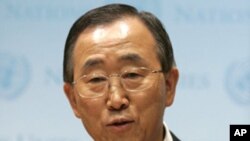U.N. Secretary-General Ban Ki-moon says he is "outraged" by Libya's deadly crackdown on anti-government protesters, and told Libyan leader Moammar Gadhafi to stop the violence "immediately."
Speaking on a visit to Los Angeles Monday, Ban said he had a 40-minute phone conversation with Gadhafi earlier in the day and "forcefully" urged the Libyan leader to end attacks on demonstrators by the security forces. Ban said Gadhafi responded by "explaining and characterizing" events.
Ban said he has seen "very disturbing and shocking scenes" of Libyan security forces firing at protesters with warplanes and helicopters, actions he termed a "serious violation of international humanitarian law." He said he told Gadhafi that human rights, freedom of assembly and freedom of speech must be "fully protected."
The U.N. Security Council is due to hold emergency consultations on the turmoil in Libya Tuesday morning. Libya's deputy U.N. ambassador Ibrahim Dabbashi requested the meeting after turning against Mr. Gadhafi and calling for him to be ousted.
Dabbashi said he and other Libyan diplomats in New York want international action to stop the Libyan leader from committing what they labeled a "genocide" against the Libyan people.
U.S. Secretary of State Hillary Clinton said Monday Washington joins the international community in "strongly condemning" what she called "unacceptable bloodshed" in Libya. She said the Obama administration is working "urgently" to send Libya's government a message that it must respect "universal rights" of free expression and assembly.
Earlier, the U.S. State Department warned Americans to defer all travel to Libya due to the ongoing unrest, and urged those in the country to limit their movements and seek shelter, especially after dark.
Qatari Prime Minister Hamad bin Jasim bin Jabr al-Thani appealed for immediate international action to end the Libyan crackdown and called for an Arab League meeting on Tuesday to discuss the crisis. The group's secretary-general, Amr Moussa, also demanded an end to the violence, saying he sees the Libyan protesters' demands as legitimate.
An international coalition of human rights groups made a similar appeal for urgent global efforts to stop what they called "mass atrocities now being perpetrated by the Libyan government against its own people." The coalition also asked the United Nations to eject Libya from the Geneva-based Human Rights Council.
British Prime Minister David Cameron described the Libyan crackdown as "appalling" and a "most vicious form of repression." French President Nicolas Sarkozy condemned what he called the "unacceptable use of force" in Libya.
Iran's Foreign Ministry also condemned Libya for suppressing what it called the "righteous demands" of Libyans engaging in a regional Islamic awakening. Iran has faced criticism from Western nations for carrying out its own violent crackdown on anti-government protests in recent days.
Dabbashi and other Libyan diplomats at the United Nations called for Gadhafi to face prosecution at the International Criminal Court for crimes against humanity. They also urged the international community to deny entry to the Libyan leader and to be on the lookout for money laundering in case he tries to flee the country or send funds abroad.
The chief of the Libyan mission to the United Nations, Ambassador Mohamed Shalgham, declined to endorse his colleagues' demands.
Some information for this report was provided by AP, AFP and Reuters.




